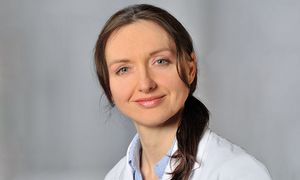What are...
Anxiety disorders?
Some people react with anxiety to situations in which there is no real danger objectively. This can lead to considerable impairment of their everyday lives.
Among the best-known anxiety disorders are claustrophobia, a fear of flying, and a fear of heights. Other common specific anxiety disorders are social phobia, the fear of failing in social interaction with other people, or agoraphobia, which is triggered by certain places and situations such as wide open spaces or crowds of people. Animals or even certain objects can also be the subject of specific phobias.
The symptoms range from slight discomfort to panic attacks with physical symptoms such as shortness of breath, a racing heart, sweating or tremors. Other types of anxiety disorder include panic attacks with no apparent external cause, which can occur unexpectedly and several times a day for a short period of time, and generalized anxiety, which is defined as a permanent state of anxiety and tension. Approximately 13 percent of the world population is affected by anxiety disorders.
Obsessive-compulsive disorders?
People with obsessive-compulsive disorders are characterized by constantly recurring unwanted thoughts or compulsive actions. Although patients recognize the absurdity, they cannot escape from this. For example, some people feel the urge to wash their hands constantly, check ten times in a row whether the front door is locked, or they constantly ponder what it would be like if someone close to them were to come to harm. This requires a lot of energy in everyday life and can lead to exhaustion and depression. OCD affects about two to three percent of the population.
Eating disorders?
Eating disorders are characterized by constant mental and emotional preoccupation with the topic of food and usually occur in the forms of anorexia, combined eating and vomiting (bulimia), and frequent binge-eating attacks.
Although eating disorders mainly affect adolescents and mostly women in their teens and beyond, they are present in all social classes, age groups, and all genders.
Therapy
Anxiety and obsessive-compulsive disorders as well as eating disorders are treated primarily with behavioral therapy:
The individual therapy plan, which is based on the S3 guidelines of the DGPPN, thus comprises specialized methods of psychotherapy that aim to replace old behavior patterns with new ones. These include, for example:
- individualized disorder-specific psychotherapy with exposure exercises or eating training
- disorder-specific and cross-disorder group psychotherapy
In addition, we offer supplementary therapies and, if necessary, drug therapy.
If desired, the relatives can be involved in the treatment through family meetings.
Inpatient and day-care treatment
The main ward 5-East provides 16 beds. We establish the treatment plan on the basis of extensive medical, psychiatric, and psychological diagnosis. Depending on the severity of the disorder, we offer inpatient or day-care treatment. Day-care treatment is provided either on the ward by the ward’s medical team, or in the Psychosomatic Day Care Clinic.
We work closely with the self-help groups of the city of Würzburg.
Clinical studies
The Comprehensive Anxiety Center (IZA) has been offering individual outpatient, day-care and inpatient treatment options since 2018. We work in close cooperation with the University Clinical Psychology Outpatient Clinic, partly within the framework of therapy studies funded by the DFG and the BMBF.
Contact
Appointment
Policlinic
Phone: + 49 931 201-77800
E-Mail: ep_poli@ukw.de
In-patient care
Phone: +49 931 201-76050
E-Mail: ep_poli@ukw.de
Address
Klinik und Poliklinik für Psychiatrie, Psychosomatik und Psychotherapie des Universitätsklinikums | Margarete-Höppel-Platz 1 | 97080 Würzburg | Deutschland

